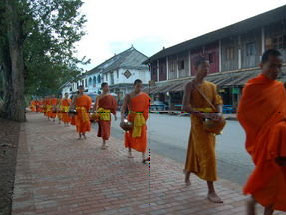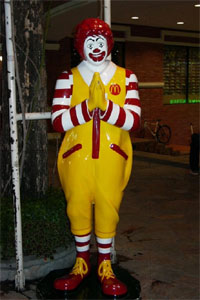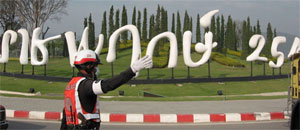Useful Travel Info |
DO’s and DON’Ts |
General Thailand Travel Tips
- Never travel without travel insurance from a reputable company
- Leave your valuables & passports in the safety boxes or lockers at your accommodation
- Photocopy all travel documents
- On a copy of your passport, write down your tour leader’s or tour company’s contact details and carry this with you at all times
- Currency exchange and ATMs are readily available so there is no need to risk carrying large amounts of cash
- The transportation system in Thailand is generally very efficient, however booking in advance in recommended, especially overnight trains on the major tourist routes. It is worth noting that low cost domestic flights operate in Thailand and could save a large amount of time for a little more money
- Never leave bags unattended and never pack valuables or travel documents in your main backpack, these should always be carried on your person during transit
- Beware of people approaching you on the street with offers of free drinks, cheap transport or telling you that your chosen accommodation or attraction is closed. Scams can be quite elaborate but trust your instinct and keep going
- Always check the accommodation facilities are in working order and report any damage when you arrive to avoid being charged when you leave
- This applies to hiring any equipment, such as motorbikes or jet skis – check, report and even photograph before use
- ‘Please Do Not Disturb’ signs can be useful for hanging outside when you are leaving the room to give the impression that the room is occupied and carrying your own quality padlock is often safer than using the provided ones in guesthouses
- Don’t drink the tap water
Visa Information
Australians, Americans, Canadians, British and New Zealanders do not currently require a visa for Thailand for stays up to 30 days. However, travelers will only get 15 days of stay if arriving without a visa at a land border checkpoint from a neighbouring country. Please see the below chart though we advise you check with your travel agent before you travel as these are subject to change.
| 0 = Nationals must apply for a visa before travelling to Thailand 15 = 15 day entry stamp available on arrival 30 = 30 day entry stamp available on arrival 90 = 90 day entry stamp available on arrival |
||||
| Albania 0 Andorra 0 Argentina 90 Australia 30 Austria 30 Bahrain 30 Belarus 0 Belgium 30 Bhutan 15 Brazil 90 Brunei 30 Bulgaria 0 Canada 30 Chile 90 |
China 15 Croatia 0 Cyprus 15 Czech 15 Denmark 30 Egypt 0 Estonia 15 Finland 30 France 30 Greece 30 Hong Kong 30 Hungary 0 Iceland 30 India 15 |
Indonesia 30 Ireland 30 Israel l 30 Italy 30 Japan 30 Korea (South) 90 Kuwait 30 Laos: 30 Luxembourg 30 Macau SAR 30 Malaysia 30 Malta 0 Mexico 0 Monaco 0 Netherlands 30 New Zealand 30 |
Norway 30 Philippines 30 Poland 15 Portugal 30 Qatar 30 Romania 0 Russian Federation 15 Saudi Arabia 15 Singapore 30 Slovakia 15 South Africa 30 Spain 30 Sweden 30 Switzerland 30 |
Taiwan 15 Turkey 30 Ukraine 15 United Arab Emirates 30 United Kingdom 30 United States America 30 Venezuela 0 Vietnam 30 Yemen 0 |
Thai Language
Thai is the official language. It is a tonal language and so it’s not so easy for English-speaking people to get right. However, do try the effort will be rewarded with smiles and maybe even a shopping bargain! This site has the top ten phrases and you can hear each one being said, so no excuse, start practicing!
Thai Food
Thailand has some of the best and healthiest food in the world; take a look at these recipes to give you an idea of the sheer range of food you can explore while you’re here.
Getting around
It’s fairly cheap and easy to get around and there’s a wealth of ways to try from the skytrain to a songtaew. As many of our trips start in Chiang Mai here’s some info on getting here. You can get here by train, bus or plane.
Bangkok to Chiang Mai
For its sheer convenience the best way to get from Bangkok to Chiang Mai is by taking the 50 minute domestic flight. On average a flight costs $70 but can be as low as $30 if you book early. There are many low budget airlines running this route.
Thai Air (national carrier, fly to all destinations more expensive but most reliable/refundable tickets)
Air Asia (number 1 budget airline, you can supersize your baggage allowance with this airline)
Nok Air (budget airline, fly out of the old Don Mueng airport in downtown Bangkok)
Fly 12 Go (budget airline)
The train takes around 12 hours and costs around $20. All the relevant information can be found here.
Weather
Nov-Feb: High Season – The temperature ranges from 18 – 32?C in Bangkok, while in Northern and North Eastern Thailand, it can get quite cool with early morning as low as 8 – 12?C and rising to around 20 by midday. Nights can be particularly chilly and at high altitudes the temperatures can and do drop below freezing.
March -June: Hot Season – The temperatures in Bangkok average around 34 but can often reach 40?C, with humidity levels at 75%. Be advised that April is the hottest month across the country but is also home to the celebration of the Thai New Year (Songkran festival: see below).
July- October: Rainy Season – The humidity averages just below 90% and temperatures around 29?C in Bangkok. This season can be a bit unpredictable but is certainly not the constant downpour of rain like you might expect. It also has the added bonus of being lush, green and less touristy.
The Southern region of Thailand really has only two seasons – the wet and the dry. These seasons do not run at the same time on both the east and west of the Peninsular. On the Western and South Western, the monsoon brings rain and often heavy storms from April through to October, whilst on the East coast the most rain falls between September and December.
| Celsius | Fahrenheit |
| 0 | 32 |
| 10 | 50 |
| 20 | 68 |
| 30 | 86 |
| 40 | 104 |
| 50 | 122 |
Favorite Festivals
For the main festivals dates and events when you’re visiting check out Tourism Thailand’s website.
Our two favourites here at Next Step Thailand are…
Songkran
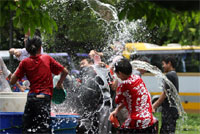 The Thai New Year coincides with many calendars of South and Southeast Asia and is celebrated every year from the 13th to the 15th of April. Traditionally, Songkran was a time to visit and pay respects to elders, including family members, friends and neighbors. Nowadays, the most evident celebration is the people throwing water at each other on the streets, which is meant to symbolise the washing away of the bad. Wat visits (Buddhist monasteries) to pray and give food to monks and cleansing of all the Buddha images by gently pouring water mixed with a Thai fragrance over them are also practiced and in many cities, such as Chiang Mai, the images from the city’s important monasteries pass through the streets on decorated floats so that people can ritually ‘bathe’ them as they pass by. It is believed that these things will bring good luck and prosperity for the New Year.
The Thai New Year coincides with many calendars of South and Southeast Asia and is celebrated every year from the 13th to the 15th of April. Traditionally, Songkran was a time to visit and pay respects to elders, including family members, friends and neighbors. Nowadays, the most evident celebration is the people throwing water at each other on the streets, which is meant to symbolise the washing away of the bad. Wat visits (Buddhist monasteries) to pray and give food to monks and cleansing of all the Buddha images by gently pouring water mixed with a Thai fragrance over them are also practiced and in many cities, such as Chiang Mai, the images from the city’s important monasteries pass through the streets on decorated floats so that people can ritually ‘bathe’ them as they pass by. It is believed that these things will bring good luck and prosperity for the New Year.
Loy Kratong
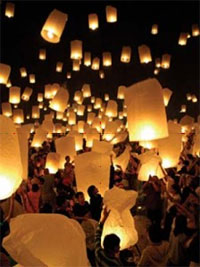 Originating in Sukhothai and celebrated throughout Thailand (with festivities in Chiang Mai and Ayutthaya being particularly notable), Loy Kratong occurs on the full moon of the 12th month in the traditional Thai lunar calendar, which usually falls in November in the western calendar. “Loi” means “to float” and “Krathong” is a small raft. Traditionally made from a banana tree and beautifully decorated, thousands of these rafts are released on a river on the full moon of that month to honour the Goddess of Water. The Government and many corporations and organisations build bigger and more elaborate rafts and the fireworks and beauty contests that accompany this tradition ensure a spectacular celebration.
Originating in Sukhothai and celebrated throughout Thailand (with festivities in Chiang Mai and Ayutthaya being particularly notable), Loy Kratong occurs on the full moon of the 12th month in the traditional Thai lunar calendar, which usually falls in November in the western calendar. “Loi” means “to float” and “Krathong” is a small raft. Traditionally made from a banana tree and beautifully decorated, thousands of these rafts are released on a river on the full moon of that month to honour the Goddess of Water. The Government and many corporations and organisations build bigger and more elaborate rafts and the fireworks and beauty contests that accompany this tradition ensure a spectacular celebration.
Do’s & Don’ts in Thailand
One of the main reasons people travel is to explore other cultures and establish how other countries and cultures do things differently. Thailand is an amazingly tolerant country. However, so you’re remembered for the right reasons here’s our simplified list of dos and donts.
The Monarchy
The monarchy is revered by all Thais and rightly so, just ask any Thai about the huge number of fantastic charitable projects they maintain. However, if you come from a culture like that in the UK, where royals are often in the news and are sometimes subject to criticism, then be especially careful. Criticism of the king and royal family is not just frowned upon in Thailand; it is against the law – a punishable offence that is taken very seriously. This respect extends to all royal images, so please take extra consideration when you handle Thai money or other royal images.
Buddhism and Temple Etiquette
Thailand ’s national religion is Theravada Buddhism and it is very important to be respectful of this. Buddhist temples (called ‘Wats’ in Thai) are welcoming places and offer a unique opportunity to understand and learn about Buddhism. Always dress ‘politely’ when entering a temple or religious shrine. So no tank tops, short shorts or scruffy clothes. Imagine you were meeting your partner’s parents for the first time and that’s where you need to pitch it, no knees or shoulders showing! At Wat Prakaew they do check and you may be denied entry.
When in a temple please respect all Buddha images whether big or small, never sit on a Buddha image and always take photographs respectfully. When entering a temple remove your shoes and never face your feet towards a monk or a Buddhist image. If you are sitting sit cross legged or put your feet behind you.
Buddhist monks follow a strict doctrine which prevents sensual contact, this means that they are not allowed to touch or be touched by a woman or accept anything a woman might offer. If a woman wants to give something to a monk it should be given via a man, or placed on a piece of cloth.
See this outline on Wikipedia for further sources of information on Buddhism.
Greetings
Thais rarely shake hands; they ‘wai’ – a gesture made by placing your hands together in front of your face a bowing a little. Generally, you should not wai to a child and a younger person should wai an older person first. However, these rules are possibly a little more flexible as far as a foreigner is concerned.
The Head & Feet
Body parts such as the head and face are considered “thii soong” (high place) and feet “thii tam” (low place). So don’t pat anyone on their head, even as a gesture of support. Whereas the head is the highest point of the body, the feet are the lowest. Do not point at things with your feet, be tempted to switch on fans, close doors etc on with your feet and try at all costs to avoid stepping over people. Also avoid showing the soles of your feet or shoes to anyone, its considered very rude. So try not to put your feet up on chairs, tables or on the seats of public transport.
Behavioral Codes
In Thailand shouting and getting hot headed are entirely frowned upon, whatever the situation. There may be times when you face frustrations, for example in a Thai post office, but if you have to vent please do it quietly and calmly! Shouting is counterproductive in Thailand and will not get you anywhere.
Kissing, cuddling and similar behaviour are frowned upon if in public – especially amongst older Thais. This attitude may be more liberal in Bangkok and among younger Thais but still bear this in mind during your time here.
Safety
Generally Thailand is a very safe country and crime against tourists is low. Just follow your common sense; if you wouldn’t do it at home then don’t do it here. Try not to go places alone, especially late at night or near the beach. Watch your things when you’re out and think about how you will get home in advance. Always sit in the back of taxis not the front and if you’re a woman take a scarf to cover up late at night- Thai girls do it for a good reason. Consume alcohol responsibly and if you are drunk try to mind what you say. Finally always make sure that you have your guide’s number in your phone and the hotel address card in your pocket
Thailand takes drug use very seriously and the penalties are stiff. To avoid the harsh penalties and also the trouble it brings for other group members; just don’t use them in Thailand. Dropping litter and smoking in the street is illegal – you can be fined 2000 Baht and it is also no longer possible to smoke in air conditioned buildings. If in doubt ask. Your guide will always be more then happy to tell it to you straight.
Bargaining and Tipping
Market shopping generally involves a good deal of bargaining so start as low as you can and generally expect to pay a third to a half of the seller’s original price. Greeting them in Thai is often a good way to open and in the end be reasonable and remember that their wages are likely to be a mere fraction of your own. This may also apply to tuk-tuk drivers.
Tipping in Thailand is the same as the West in that good service should be rewarded. 20 Baht (just less than $1) should be the minimum but 10% is advised – this applies to restaurants, bellboys, beauticians and any other service or part of the hospitality industry
When participating in a tour or visit, it is common practice for local guides to receive at least $1 per day per person and tour leaders $2 per person per day.
9 Important Do’s and Don’ts While Traveling in Thailand
- The royal family is very important to the Thai people so this needs to be respected – negative commenting is forbidden as is damaging images such as money
- Thailand is primarily a Buddhist country and therefore non-confrontational so never lose your temper or raise your voice at a Thai
- Temples (Wats) have dress codes so you are required to cover your shoulders and wear a long skirt or trousers
- Avoid pointing your feet at monks or Buddha images – for example sit cross legged or with your legs underneath you
- Women are not supposed to touch or pass things directly to a monk – anything you wish to offer can be placed on the monk’s napkin
- Always remove shoes before entering temples, houses and some shops – if in doubt, shoes at the door should be a clear indication
- Greeting and thanking people in Thailand is usually in the form of a ‘Wai’ and rarely shaking hands – this is a prayer-like stance with your palms together at least at chest level. If someone does this to you then it is polite to return the gesture
- Avoid touching people’s head, especially people you don’t know closely as this is considered highly offensive
- Public displays of affection are considered inappropriate, especially in a religious area 10. Smoking and drinking in public places such as schools, temples, parks, etc is frowned upon 11. Blowing your nose when eating in company is considered bad manners

